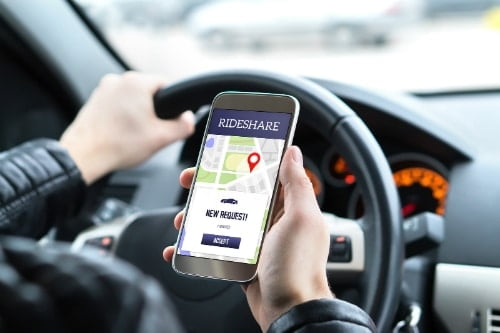While being a driver for Uber or Lyft is a great way to earn extra income, it can also come with many tax benefits and disadvantages. Getting an understanding of what can help you at tax time is essential so that you do not owe Uncle Sam more than what you expected.
Here are a few tax tips to help you get a handle on your tax situation.
Losses can help reduce income
If you are making a significant profit with Uber or Lyft, congrats! That, of course, is a good thing! But if you are just starting and have yet to make it profitable, this may not be a bad thing and in fact could be advantageous.
As a driver for Uber and Lyft, you are responsible for reporting your earnings and expenses. Drivers report these items as a sole proprietor on their income tax returns. A sole proprietor is a person who operates a business which has not been incorporated or recognized by the state. As such, they are liable for their share of income.
Using form Schedule C, Profit and Loss from a Business, if expenses exceed income, a loss will be reported. In the case of a loss, this may benefit the driver. Since losses can reduce other income, such as wages received from an employer, rents and royalties received and other sources of income, it can also reduce the amount of taxes owed as well.
Understand your deductions
Many deductions may be available to you. Since you use your cell phone to take calls, navigate to your destination, or may be required to utilize the internet, you may be able to deduct these. Keep in mind, that the amount you can take is the percentage you utilize for business. For instance, if you only use 25% of your phone for Uber or Lyft and your annual cost is $1,000, you are entitled to a $250 deduction at tax time.
Also, you are also able to deduct mileage that you use to travel from your home, to your pick up and drop off point, and back to your home destination. The Internal Revenue Service (IRS) allows for two ways to deduct mileage on the tax return. Taxpayers can take the standard deduction method, which is merely taking the total distance and multiplying it by the standard mileage rate. For the 2018 tax year, the standard mileage rate is 54.5 cents per mile.
Taxpayers can also choose actual expenses. In this case, taxpayers can deduct gas, insurance, lease payments, repairs and maintenance and more for the percentage used for business as a deduction on the tax return. Whatever method you choose; it is best to keep a mileage log to ensure you are getting the most at tax time.
Deduct your home office expenses
Of course, you may be familiar with the traditional expenses that you can deduct, but there is so much more! Consider this, if you have a small office at home specifically designed for your business, you may want to consider a home office deduction. This deduction allows small business owners to take a deduction for expenses associated with the business use of their home. Keep in mind; it doesn’t matter whether you are a renter or a homeowner, you still may be able to deduct the expenses.
At tax time, you have an option between the simplified method or actual expenses. The simplified method as the name suggests is a simpler way to take the deduction. Taxpayers simply take the total square footage of the home office (not to exceed 300 square feet) and multiply by $5. This amount would provide the simplified home office deduction expense. Also, taxpayers can also consider actual expenditures occurred during the year for the home office deduction. If the home office is approximately ten (10%) percent of your total home square footage, then the taxpayer can take ten (10%) percent of your rents, mortgage interest, taxes, utilities, insurance, repairs and maintenance and other expenses.
Taxes, taxes and more taxes
Unlike an employee, who usually pays his or her share of taxes each payday, you are responsible for paying your taxes for income earned as a driver. Sole proprietors must pay estimated quarterly tax payments throughout the year if a driver expects to owe taxes of
$1,000 or more at tax time. Payments are due quarterly on April 15, June 15, September 15 and January 15 of the following tax year. Drivers should consider speaking with a tax professional to determine what federal and state taxes drivers should pay throughout the year.
Kemberley “Kemcents” Washington, CPA is the co-founder of Washington CPA Services, LLC and the B.A.D.G.E.® plan. Visit her blog on Kemberley.com








